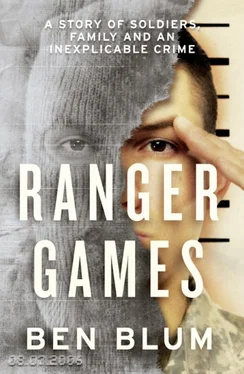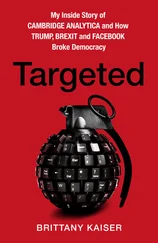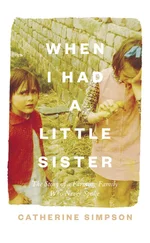By fourth grade Alex had grown into a rambunctious, sweet-natured boy with blue eyes and straw-colored hair, popular with schoolmates at Greenwood Village Elementary School, loved for his jokes and generous passing by teammates on the Littleton Hockey Association’s “Squirts” team, and worshipped by Sam and Carly. Everyone in the family remarked on what a great big brother he was. He got more and more serious about hockey. One day when Norm was doing his daily sit-ups, push-ups, and dumbbell curls in the basement den after work, Alex left his brothers and sister watching TV and wandered over to see how many push-ups he could do, then how much weight he could lift. Soon he was jumping in regularly, just as Norm had once helped his own father push aside the coffee table for army-style calisthenics every weekday at 6:30 a.m.
As Alex’s coach on the Squirts team, Norm was putting him through further punishments each day at practice: sprints up and down the ice that left his teammates gasping in his wake. One afternoon at lunch with a friend of Norm’s who had just watched Alex play, the man’s young son asked Alex if he was going to be on the Colorado Avalanche when he grew up. Alex was just beginning to allow that there were a few other NHL teams he might be willing to settle for when Norm flashed him a sardonic grin that stopped him cold.
Norm likes to describe himself as a “realist.” In his coaching days he was unafraid to inform parents that their darling progeny had no future in competitive ice hockey. He intended it as a kindness. When some poor couple from Colorado Springs drove their no-talent hack an hour each day to practice with a Littleton team, Norm always took it on himself to inform them that if scouts were going to be interested, they would have called by now. “Because their kid can skate backward and they can’t skate at all, they’re thinking he’s got something special,” he explained to me once. “But just ’cause their kid is ten or twelve and can skate backward doesn’t mean he has a ticket to play in the NHL.”
Norm was careful to extend his hockey realism to his own children. When Max got to be ten years old, Norm suggested that he hang up the skates. Alex was different. He really loved the game, even if his talent was not world-class.
In the car ride home from lunch, Norm told Alex how it was. The NHL was Valhalla, Mount Olympus, the Forbidden City, inaccessible to mere mortals. Norm himself had been rudely disabused of his NHL ambitions when he got to college and saw what real hockey talent looked like. The only reason he could skate with former NHL players now was that with all the bike racing he did in the Rocky Mountains, his conditioning as a fortysomething commercial real estate broker was unmatched even by young pros. Maybe one guy out of everyone Alex had ever played against had a whisker of a chance. Was Alex the biggest, strongest kid on the ice? Could he skate backward faster than anyone he knew could skate forward? Did he have “dangles,” the talented stick handler’s uncanny ability to flip the puck back and forth through wormholes in space that no defender could follow? Alex shrugged, near tears, and guessed he didn’t. What he did have, Norm hastened to point out, with no little pride, was a phenomenal work ethic. As long as he was willing to keep twice as fit and twice as strong as any other kid and battle twice as hard for every puck, he would keep earning a place for himself as a “grinder”: a player who makes up for his mediocrity with toughness, team spirit, and willingness to do the less glamorous jobs on the ice.

As is common with Norm’s take on the world, his view of Alex’s hockey talent was gradually enshrined as common wisdom by everyone in his social universe, including Alex’s future coaches. To a man, in their letters to Judge Burgess, they would speak of their great personal love and admiration for Alex while taking pains to point out that he had no great aptitude for the game.
While not a “star” player … most dedicated player on the team … caring little for personal recognition …
Not the most skilled player on the team … constant pursuit of his personal growth and team accomplishments …
Talent he did not possess … had to get by on hard work …
You would never guess from their letters that by the end of high school Alex had earned a position on perhaps the best youth squad in Colorado, after consistently racking up team-high assists, and stood a good chance of a college hockey scholarship after a year or two in the junior leagues. Norm intended his “realism” lovingly, as a ward against the pain of disillusionment that he himself had felt, but ten-year-old Alex did not have that kind of perspective on his father and coach. He had always loved hearing Great-Uncle Bernie’s stories of training soldiers after the Korean War, but I think Norm’s dismissal of any chance that he would ever play professional hockey marked the moment when World War II subsumed the NHL as the arena of Alex’s dreams.
At first much of his interest centered on our grandfather, Al Senior, who fought as a sergeant in command of a pair of half-track 50mm machine guns in the army’s Fourth Infantry Division, landing in Normandy shortly after D-Day and punching Junkers, V-1s or doodlebugs, and Messerschmitts out of the sky above the hedgerows as the invasion pressed into the continent. The few stories Norm had passed on to Alex electrified him. While his fifth-grade classmates worked their way through Are You There, God? It’s Me, Margaret, he began devouring Stephen Ambrose’s trilogy of military histories D-Day , Citizen Soldiers, and, his favorite, Band of Brothers , about the 101st Airborne Division’s elite Easy Company of paratroopers, who dropped behind German lines and assaulted heavily fortified machine-gun nests in advance of the landings at Omaha and Utah Beaches.
Ambrose writes from the perspective of the enlisted men in the field rather than the generals who tell them where to fight. This makes for a lot of suddenly dead protagonists, but the tale never loses its triumphant momentum, because the real hero is always the company itself, of which individual soldiers are like moods that come and go, intervals of complaint or jokes or kindness. Alex soon had his favorites—Dick Winters, the lieutenant who led a stunningly successful capture of a German “Eighty-Eight” gun emplacement, and Bob Guernsey, who applied for early release from the London hospital where he was recovering from a shrapnel wound so he could rejoin the company for its assault on the Ardennes—but what he loved most was the collective spirit that enveloped them. Page by page, he highlighted passages about the skill, perseverance, and heroic brotherhood of American men at war.
Alex began learning the American infantryman’s kit in intimate detail. After school he spent hours in the tunnel of interlinked hollows behind the backyard juniper hedge, reenacting battles with a sawed-off hockey stick as a flintlock musket, Browning automatic rifle, or M1 Garand, ending with elaborate death scenes amid the pinecones and dry needles that left him dirty enough to horrify his mom. The Revolutionary War, the Civil War, and World War I all got their due, but D-Day was his specialty. One summer he built a replica of Omaha Beach in the sandbox, complete with Belgian hedgehogs made of toothpicks and German bunkers on the bluff, and blew up toy soldiers with firecrackers as they slogged in from the water.
For his daily workouts, Alex began interspersing the sit-ups and push-ups he had picked up from his dad with a Navy SEAL regimen he learned on vacation in Coronado, California. All this strength training gave his hockey game a boost. Norm and Murray had finally stepped aside as coaches for the Littleton Hawks, where Alex had taken his father’s advice to heart and settled into a strategic place for himself as a passer and penalty killer who specialized in corner battles. Some of the teammates with whom he had been playing since he was seven years old were now among the best in the state. What Alex liked better than anything was watching a close buddy of his raise his stick in victory after scoring off a puck that Alex had dug out by grinding away against the boards. He made the most sense to himself as a member of the team.
Читать дальше













